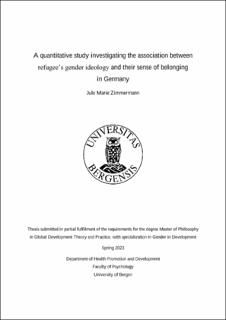| dc.description.abstract | Background: Following the “refugee crisis” in 2015/16 the German migration discourse has become more and more focused on the “incompatibility” of Islam with German society and associated “oppressive” gender roles “threatening” German culture. Gender ideologies assumed to be held by refugees are often used by right-wing groups, to questioning their belonging in Germany and to reinforce racist and Islamophobic narratives. Study Aim: The aim of the following study is to examine the association between gender ideology and refugee´s sense of belonging in Germany. The study will assess the influence of a variety of aspects of integration, such as time spent with Germans, people from other countries and the refugees home country, as well as contact with Germans, German skills, employment status, marital status, religious affiliation, and residence status. Data and Methods: 1625 refugees between the ages of 19 and 93, who took part on both the second (2017) and third (2018) of the IAB-BAMF-SOEP-Surveys for refugees, made up the sample used in the study. All participants arrived in Germany after 2013 and the majority had been granted a residence permit at the time of the survey. Univariate (Descriptive Statistics, Reliability Analysis) and Bivariate analysis (Pearson-Product Moment) was performed. To assess the association between Gender Equality and sense of belonging, a Hierarchical Regression Analysis was performed, controlling for the impact of different integration factors. Results and Discussion: This study did not find any evidence that gender ideology of refugees is associated with their sense of belonging. Shared values are generally considered to be an important aspect of social belonging, but other markers of social integration, such as German skills, contact to Germans and religious affiliation, were found to be more important. Contrary to the belief held by populist groups, but supported by previous research, the study found that egalitarian gender ideologies were relatively widespread among the participants. Analysed from a political perspective, the study found, that it is the exclusionary discourse on gender ideology that is hindering social integration of refugees instead. Conclusion: This study was able to illustrate, that from a subjective perspective gender ideology has no effect on refugees´ sense of belonging. The narrative that refugees’ assumed gender ideology is the biggest obstacle in their integration process, is instrumentalising gender ideology, to push racist and Islamophobic narratives under the guise of protecting an imagined German culture and society. Future research may expand on the findings of the study by conducting a longitudinal perspective on how refugees’ sense of belonging is changing over time, as well as implementing a more multidimensional framework of gender ideologies. | |
